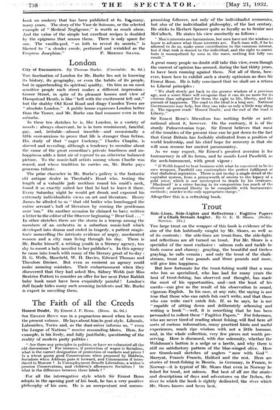London
City of Encounters. By Thomas Burke. (Constable. 8s. 6d.) Tim. fascination of London for Mr. Burke lies not in knowing its history, its geography, or even the habits of its people, but in apprehending its spiritual quality. On him as on most sensitive people each street makes a different impression : Gower Street, in spite of its pleasant houses and view of Hampstead Heath, is like "hell with the excitement left out," but the shabby Old Kent Road and dingy Camden Town are
absolute London." A public house expresses London better than the Tower, and Mr. Burke can find romance even in the suburbs.
In these ten sketches he is, like London, in a variety of moods : always observant, he is in turn reminiscent, fanciful, gay, sad, irritable—ahnost irascible—and occasionally a little over-anxious to prove that life is stranger than fiction. His study of that eager Cockney," Charles Chaplin, is shrewd and revealing, although a tendency to moralize about the cause of the great comedian's private loneliness and un- happiness adds a faint air of reproof to an otherwise balanced picture. To the music-hall artists among whom Charlie was reared, and whose tradition he carries on, Mr. Burke pays generous tribute.
The prize character in Mr. Burke's gallery is the fantastic old antique dealer in Theobald*s Road who, testing the length of a valuable jade necklace round his maid's neck, found it so exactly suited her that he had to leave it there. Every Saturday night he would get drunk and expound his extremely individualistic views on art and literature. Henry James he alluded to as " that old butler who humbugged the entire servant's hall of literature by coming the gentleman over 'em." On another occasion he claimed to have written a letter to the editor of the Observer beginning " Dear God " In other sketches there are the storm in a teacup among the members of an orchestra in a suburban music-hall which developed into drama and ended in tragedy, a patient magis- trate unravelling the intricate evidence of angry, uneducated women and a city man living through his day. There is Mr. Burke himself, a retiring youth in a literary agency, too shy to escort a lady novelist to her publisher's. In this agency he came into touch with many of the literary great of to-day H. G. Wells, Ma.sefield, W. H. Davies, Edward Thomas and Theodore Dreiser. But even so eminent an agency could make amusing mistakes. Their embarrassment when they discovered that they had asked Mrs. Sidney Webb (nee Miss Beatrice Potter) to consider an offer for her next Peter Rabbit baby book must have been exquisitely painful ! London's dull façade hides many such amusing incidents and Mr. Burke is expert in unveiling them.




































 Previous page
Previous page